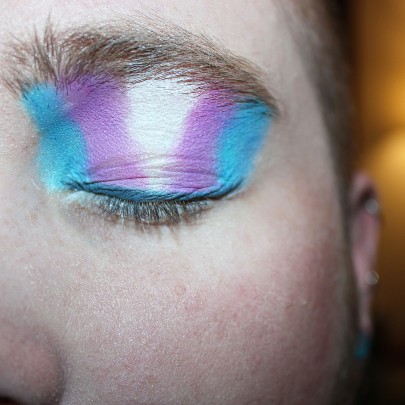August 15, 2022 Industry news
Proudly sponsored by GS1 UK, The Beauty Exchange 2022 by Enterprise Nation featured a variety of insightful panels, networking opportunities and talks including a discussion between our CMO and membership director, Sarah Atkins, and Jessica Blackler, the founder of Jecca Blac.
Launched in 2017, Jecca Blac is gender free makeup brand that celebrates all makeup wearers. By championing inclusivity and individuality, they strive to create a safe space for anyone who enjoys makeup - regardless of their gender, identity, expression, sexuality, age, ethnicity, shape, size or ability.
Filling a major gap in the market, the brand has been turning heads in the cosmetic industry ever since. Jessica has been listed in Forbes 30 under 30, chosen by Zalando as a Transgender Visibility Day partner, has sold more than 1.6 million products to date and is now looking to expand into the US market.
An Idea is born
Having had a strong artistic streak since childhood, Jessica originally wanted to create prosthetics for the entertainment industry.

After training at the Delamar Academy of Make-up & Hair, she embarked on a career in film and television where she gained valuable hands-on experience and began taking on individual clients between gigs.
While advertising her services on Instagram and building up a client base, Jessica began to notice a clear gap in the market. “I started to receive a lot of requests from people who were early on in their transition and wanted to learn what different makeups did and how to apply them. They basically wanted personalised make up tutorials” she said.
Jessica would meet her clients in hotel rooms for one-on-one sessions. During one of these sessions, one of her earliest clients described how makeup was an incredibly important part of their transition. “For them, cosmetics played a massive role but they didn’t feel comfortable going into department stores so wanted to get help and advice privately” Jessica explained.
As word spread, Jessica’s client list grew and she realised there were many out there with similar needs. Deciding to take the plunge and commit to this work full time, she quit the word of film and TV and set up her own studio. “This was the very beginnings of Jecca Blac” she said. “It was very much a service business before I turned it into a brand.”
Building the brand
When asked by Sarah how she developed the Jecca’s proposition and ethos, Jessica revealed that this had largely been inspired by her early clients.

“I was mainly serving trans women initially or people who identified as male but wanted to experiment with makeup. The business and the services it provided were open to all but we became much more focused on that space as we became a brand” she said.
“Jecca needed a proposition that was scalable and the Gen z consumer is quite similar to the audience I started with."
"Their attitudes towards gender are much more fluid and being able to express themselves however they wish is in their DNA.”
“All of my family and friends call me Jecca and Blac is simply an abbreviation of my surname. I had used this name for my studio and decided to keep it as I already had a loyal base of clients who I now wanted as customers”.
“In terms of building the brand itself, that all happened quite organically. My existing clients had been coming to me and asking for certain products for a reason - they wanted to be noticed and accepted as a makeup wearer.”
“I knew wanted to take the values and the products they valued and make them into a brand. I started out with the customers, just not the product. That turned out to be a good way of doing it as having all these wonderful clients really helped me in the early days. By simply speaking to them I was able to get valuable feedback on things like samples, formulas and packaging designs. This was super important so I would advise any business to do this early on. Getting feedback doesn’t need to be expensive. You can start off small, just seek immediate feedback from your target consumers.

Creating the product
By now Jessica had a brand and the beginnings of a customer base but she still needed a product. When deciding what to launch first, again Jessica took inspiration from her clients. One of the most common request she received in her studio was for a beard shadow coverage so she settled on the Correct & Conceal Colour Palette.
“This is still our second bestselling product but getting it going was a challenge” she said. “Getting first product can take ages as you are still trying to build up supplier relationships but, once you have get it going, you will hopefully have enough customers to bring out more.”
Finding a supplier
As a 19 year old with limited experience, and cash, looking to launch a product in highly competitive and well-regulated industry, Jessica knew that finding a supplier willing to take a chance on her would be a challenge.
“At the end of the day, supplier’s don’t owe you anything so it is very unlikely you will find one who is willing to let you test the market with short production runs. We had to wrestle with minimum quantity orders from day one so I needed to make sure I had a plan for bringing in the money required to fund these order. That is why a lot of people plan a year or two ahead and put money aside for the future and I did the same with my studio. Every spare penny I earned went towards building the brand.”

Jessica said that while her young age made it harder to get taken seriously when she was starting out, she believes attitudes are starting to change as there are now many young influencers who are building really successful fashion and cosmetic brands.
“I did find it quite challenging at first but I eventually found a supplier I could work with. It helped that I knew exactly what I wanted as it meant I could be quite savvy. I probably got on their nerves at first but being persistent is what got us there in the end. We are still with that supplier today and they have produced over 1.6 million products for us now so they definitely go their return.
Help and support
As a sole founder, Jessica had a lot to learn. Creating your product is just the start. You need to ensure you have the relevant contracts, paperwork and compliance assurances in place.
Jessica described how mentors played a huge role in her development. “I started with the NatWest Entrepreneur Accelerator scheme” she said. “It is a six-month programme designed to help entrepreneurs with high growth businesses scale up. They gave me loads of support, mentoring, networking opportunities and even office space”.
“Having good mentors allows you to have honest conversations and having conversations with and running ideas past people who weren’t your customers or family. You want to keep a level of distance for things like that. You can be completely transparent with an mentor and can expect honest answers.”

“Google an podcasts also helped – I read and learnt all I could. When it came to raising funding I wanted to speak to other founder to learn how they had built successful businesses, understand the lingo and how they do things. You need to do your research!”
“I am originally from Wales and the Welsh government was so helpful when it came to raising funds. There were platforms where you could connect with angel investors who want to support local businesses. I was connected with our investor – a distributor and manufacturer of pharmaceuticals who already did cosmetics in other categories.”
“People will talk about finding that “strategic investor who will really help you grow further along but it really helped me at the start as I didn’t have a team so really wanted to tap into theirs – which I did to get loads of advice and get things moving.”
Going to market
Now that Jessica had secured a supplier and had placed a first order run for 5,000 products, she needed to start selling. She credits her early success with the network of clients she had been working with for the past 18 months. “I simply let my network know” she said. “These people had literally helped my create my product and build my brand so to a certain extent they felt invested and conversion was high as a result.”
Despite her initial success, Jessica knew she could not rely on her existing clients alone if she was going to grow the brand in a meaningful way. “Any money that came in from that first order run went straight back into marketing” she explained. “I built out our channels and experimented to see what worked but this took time. Back then we were purely D2C so also started to approach retailers about six months after launch as by that point we really needed an injection of cash to build momentum and our product line.”

When it came to targeting buyers, Jessica again benefited from having a good understanding of her audience. She knew that many of her customers would be looking to purchase her products discreetly so would be far less likely to buy in-person so focused her efforts on eCommerce retailers as a result.
While selling online is becoming increasingly accessible thanks to the rise of online marketplaces, back then Jessica still had to convince buyers to stock her products. “Although they don’t have a limit on shelf space in the traditional sense, they still need to see a return and don’t want their categories filled up with products they can’t sell so they have to be quite strict” she explained.
“Attracting buyers was took a lot of time and was one of the main hurdles at first. The cosmetic space is highly competitive so our gender free point of difference and the story behind it was what really helped us get through doors. Thanks to this unique point of difference, we now sell on Amazon, Zolanda and Walmart, as well as our own website.”

Love your customer
Jessica is now working hard to expand into the lucrative US market. Thanks to the help and support of their investors, the Jecca Blac team has stayed relatively small but Jessica has since brought all essential day-to-day roles, such as marketing, logistics, operations and finance, in-house. “This is why strategic investors are so great” she said. “They can help you fill any resource gaps and have a vested interest in seeing you grow.”
Her final advice for the audience was to “love your customer as much as your product - you need to really believe in the solution your brand offers. Combining and obsession with your customers with a little bit of patience and a lot of hard work is an excellent place to start”.



